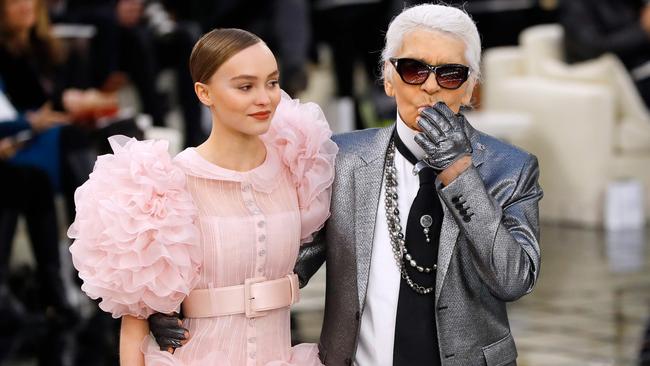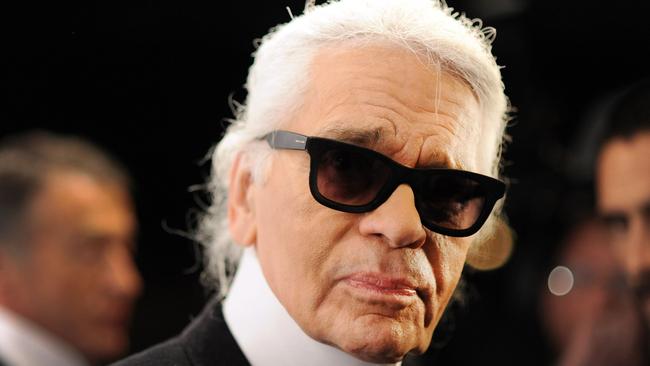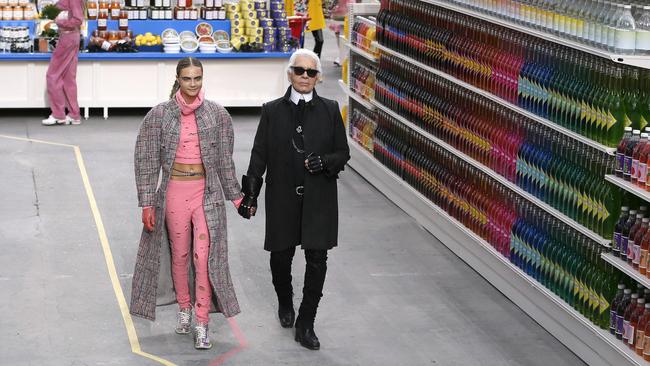Vale Karl Lagerfeld: the Prince Philip of fashion
Karl Lagerfeld’s shouldn’t be an opportunity to vilify his legacy, but to ensure we don’t erase his controversial history. For good or bad, it was what made him who he was, writes Bianca O’Neill.
Rendezview
Don't miss out on the headlines from Rendezview. Followed categories will be added to My News.
With the passing of Karl Lagerfeld comes the inevitable reflection on his incredible design legacy: a record-breaking 54 years at Fendi, the recreation of Chanel’s ‘little black dress’ for a new generation, and of course, the reinvention of the double Cs.
However, this moment should also serve as a reflection on the proliferation of the ‘problematic creative genius’ in our culture. From Woody Allen to Hugh Hefner and Chris Brown, many are quick to defend a creative legacy, no matter the cost. Yes, Karl was a genius — but he was far from perfect.
Lagerfeld was probably most famous for having his finger on the pulse — an enthusiastic supporter of youth culture, he was credited with making Chanel relevant again to people other than ‘Parisian doctor’s wives’. In practice, however, he rarely embraced the political movements associated with a typically progressive consumer.

Lagerfeld still delivered luxurious animal furs and leathers, regardless of the rage he invoked from PETA, (In fact, they clearly still can’t let it go, tweeting hours after his death: “Karl Lagerfeld has gone, and his passing marks the end of an era when fur and exotic skins were seen as covetable. PETA sends condolences to our old nemesis’s loved ones.”) until late last year when the house announced they would no longer use crocodile, snake, and stingray skin, among others.
MORE FROM BIANCA O’NEILL: This isn’t a hate crime, it’s just a pretty dress
One wonders if it was a change of heart by Lagerfeld himself, or simply a strongarm manoeuvre employed by a savvy board. He himself was quoted as saying, “the discussion of fur is childish.”
In these moments, it’s clear that his strength was often also his weakness; elaborate and creatively breathtaking shows were often the vehicle for controversy.
Like many of his luxury fashion peers, he was far from admirable on the topic of appropriation, having delivered among his moments of brilliance a Native American ‘inspired’ show, featuring white models wearing native headdresses, in (of all places to appropriate another culture) Dallas, Texas.

As the new wave of #metoo feminism loomed he created a mock feminist rally for his 2014 ‘Feminist but Feminine’ runway. It was difficult to know if he intended it as a tribute or a farce, but given he was known to be brutally honest and cuttingly cheeky — and considering his peppered history of discussing women’s rights and embracing diversity (in 2017 he declared himself “fed up” with #metoo) — one would have to assume it was the latter.
MORE FROM BIANCA O’NEILL: Cardi B is the working mother inspo we need now
Later in 2014, he brought couture to the supermarket, with a runway show featuring bespoke Chanel cornflakes boxes and cleaning products. The women walking the aisles wore embellished fur coats and bedazzled tweed suits as they collected items on their shopping list in bespoke Chanel shopping baskets. Despite the overwhelmingly positive op-eds at the time, it’s hard to see this as an homage to the average woman, considering the decidedly Prince Philip-esque Lagerfeld quotes such as these:
“[It is the] fat mummies sitting with their bags of crisps in front of the television, saying that thin models are ugly.”
“No one wants to see round women [in fashion].”
“It would have been difficult to have an ugly daughter.”
“Sweatpants are a sign of defeat. You lost control of your life so you bought some sweatpants.”

The reality is, of course, that Lagerfeld was not bringing luxury to the drudgery of the everyday woman’s existence; he was making a comment on it and judging women who juggle motherhood and a career, hastily grabbing a ‘bag of crisps’ in their ‘defeated’ outfit of sweats.
He was problematic at best; a fashion icon who represented all the worst aspects of the fashion industry and upheld them, encouraging others to buy into the status quo.
MORE FROM BIANCA O’NEILL: Serena’s outfits aren’t the problem with tennis
Yes, Lagerfeld was a visionary designer, but his vision often encompassed a decidedly narrow view of the ‘other’ — one that was upheld and even celebrated in the industry.
And so with his death, hopefully comes the passing of an era in fashion; one where the white skinny model is upheld as a figure of perfection, one where cultural appropriation and feminism is nothing more than a cool theme for a spring/summer collection.
His passing isn’t an opportunity to vilify Lagerfeld’s legacy, but instead to ensure that we don’t erase his controversial history.
For good or bad, it was what made him who he was. Now we need to move forward — now we learn from his mistakes.
Bianca O’Neill is a fashion writer.


